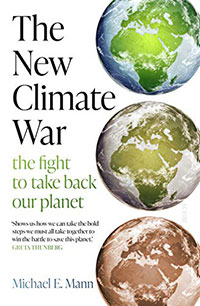 *
*
By Off the Shelf correspondent Ed Meek
If you’ve had enough of climate denialists, doomsayers, distorters and deflectors, Michael Mann’s new book provides the antidote of hope with which to fight what many are now calling the war on climate change. Michael Mann is a member of the US National Academy of Sciences and a distinguished professor of Atmospheric Science at Penn State. He is famous for what is referred to as the “hockey stick” diagram that outlines the rise in global temperature since the Industrial Revolution (between 1 and 1.5 degrees Centigrade).

The New Climate War:The Fight to Take Back Our Planet
by Michael Mann.
Public Affairs, New York, 2021.351 pages. $29.
In the effort to fight this war against climate change, Mann spends most of his book identifying the enemies of this effort in order to get us all on the same page. The first few chapters round up the usual suspects: the fossil fuel industry and the big money that is behind confusing us and sowing doubt. Mann compares the fossil fuel industry to big tobacco. “Doubt is our product,” said a tobacco executive when confronted with evidence that smoking caused cancer. Mann points to the long history of corporations attacking the messenger beginning with Rachel Carson whose book Silent Spring “ushered in the modern environmental movement.” When Carson pointed out the tragic consequences for animals of using the pesticide DDT, she was hit with character assassination by Monsanto.
As I’m sure you’ve heard, Exxon in the early 1980s, asked its own scientists to investigate the effects of burning fossil fuels. Internal memos predicted the rise in CO2 and global temperatures. Exxon decided to keep this information from the public and instead to engage in decades of obfuscation. Eventually however, this approach didn’t work because global temperatures, along with CO2 levels, were obviously rising.
So, companies like Exxon and BP decided to take another approach. Mann refers to it as the “Crying Indian.” The Crying Indian was an advertisement in the 1970s by Coca Cola in which a native American is shown shedding a tear over littering. The message of the ad was that we should all pick up after ourselves to protect our environment. The actual purpose behind this campaign was to prevent bottle bills being passed because Coke thought they would cut into their profits and to shift the responsibility for protecting the environment to us.
Mann says fossil fuel companies use this same approach to deflect the public by getting us to focus on what we, individually, should be doing. That is, if fossil fuel companies can get us to feel guilty about our role in climate change, we won’t go after them. Oddly enough, as Mann points out, liberals often buy into the idea that it is our fault rather than the fault of fossil fuel companies and the politicians who support them.
This idea is a hard one for Americans to shake with our “selfie” culture in which you are the center of the universe. We are sold the idea that we are in control, and there is a lot of peer pressure to cut back on flying or become vegetarians or drive a hybrid, but as Mann points out, although it is good if we make changes as individuals that reduce our carbon imprint, it is only if fossil fuel companies stop drilling and mining and if our politicians create laws that help us transition to clean energy that we will be able to successfully win the war on climate change.
Mann also assails those on the left and right for indulging in worst case scenarios He takes on David Wallace Wells who wrote Uninhabitable Earth, making the case that it doesn’t help the cause to scare people out of their wits. Mann’s position is that if we work together, we still have time to win the war on climate change.
Mann also calls leftists like the Sunrise Movement, Bernie Sanders and AOC to account for refusing to back a carbon tax because, according to them, it will hurt the poor. As Mann says, we need to use all the tools available and one of them is a tax on carbon.
Overall, Mann finds Greta Thunberg and the youth movement against climate change hopeful signs that we are finally beginning to deal with this problem that threatens our environment and our future. He sees us at a turning point because of the mounting evidence that something is seriously wrong with our planet. The wildfires in Australia and in California, the droughts, the floods, the warming and rising oceans and the melting ice at the poles along with the negative effects of climate change on animals, fish, birds and bees – all these factors seem to be sinking in with 63% of Americans who see that “global climate change is affecting their community” and “the federal government is not doing enough about it.” The U.S. “should prioritize developing alternative energy sources” say 79% according to a poll taken last year.
In an excellent essay in this month’s Harper’s Magazine, Greg Jackson asks: “Why not address this issue (climate change) head on? Why not seize the opportunity to stimulate our economy, rebuild our nation, take meaningful action, and come together in common purpose?” Jackson claims our country is suffering from depression and an epidemic of loneliness and that the mutual effort required to fight a war on climate change is just what we need. Michael Mann’s new book helps us frame a unified approach to fighting and winning that war. To do that Mann says, “We must vote out politicians who serve as handmaidens for fossil fuel interests and elect those who will champion climate action.”















Reader Comments